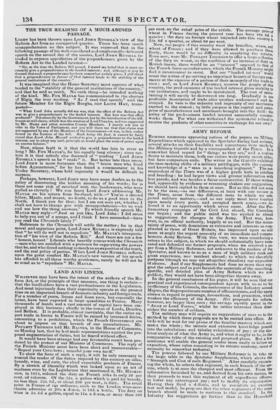LAND AND LINENS.
WHATEVER may have been the intent of the authors of the Re- form Act, or the principle of that measure, one thing is certain— that the landholders have a vast predominance in the Legislature. And most injuriously does their superiority operate at the present time on an important branch of domestic industry and foreign trade. For a number of years, linens and linen yarn, but especially the latter, have been exported in large quantities to France. Many thousands of hands and a vast amount of capital have been em- ployed in this business ; chiefly in the towns of Leeds, Dundee, and Belfast. It is probable, almost inevitable, that the entire ex- port trade in linens to France will be ruined by increased duties, amounting to a prohibition, which the French Government are about to impose on that branch of our manufactures. Mr. Poutarre THOMSON told Mr. BAINES, in the House of Commons, on Monday last, that he had made representations against the pro- posed augmentation of duties, but he feared without effect.
It would have been strange had any favourable result been pro- duced by the protest of our Minister of Commerce. The reply of the French Minister must have been short and unanswerable- " Repeal your Corn-laws ; remodel your own tariff."
To show the force of such a reply, it will be only necessary to remind the reader of the duties imposed by this country on silks, brandy, wine, and corn, the chief exportable products of France. By a stretch of liberality which was looked upon as an act of madness even by the Legislature that sanctioned it, Mr. HUSK'S- SON, in 1824, reduced the duty on French silks to only 30 per cent, ad valorem. Of the 32s. a gallon which is paid for brandy, no less than 22s. W., or about 200 per cent., is duty. The retail price in France of yen ordinaire, such as the London wine-mer- chants advertise at 289. a dozen, is 10d. a bottle. The duty on -wine is 5s. 61 a gallon, equal to 11s. a dem, or more than 100 per cent. on the retail price of the article. The average price of wheat in France during the present year has been ells. 8d. a quarter ; the duty on foreign wheat imported into this country is 33s. 8d a quarter, or about 80 per cent. Now, the people ef this country want the brandies, wines, and wheat of France ; and if they were allowed to purchase them freely, there would be no difficulty in supplying the returns, Even now, were Mr. POULETT THO:VISON to offer a large reduction of the duty on wheat, on the condition of no increase of duty oa British linens, there would be an "interest" opposed to that of the French linen-manufacturers, which the French Minister might find it inconvenient to resist. But our "landed interest" would scout the notion of preserving an important branch of foreign eere. merce at the expense of a portion of their monopoly of the trade its corn ; and, as Lord JOHN RUSSELL assures the people of this country, the predominance of me landed interest gives stability to our institutions, and ought to be maintained. The cost of main. taming it will surely be discovered ere long. Gradually is one profitable description of trade after another underininee and de- stroyed. In vain is the industry and ingenuity of our mechanics exerted to the utmost ; to little purpose is the capital and enter. prise of manufacturers and merchants brought into the field: the policy of the predominant landed interest successfully counter- works them. For what can withstand the systematic refusal to receive the products of other countries in exchange for our own?


























 Previous page
Previous page